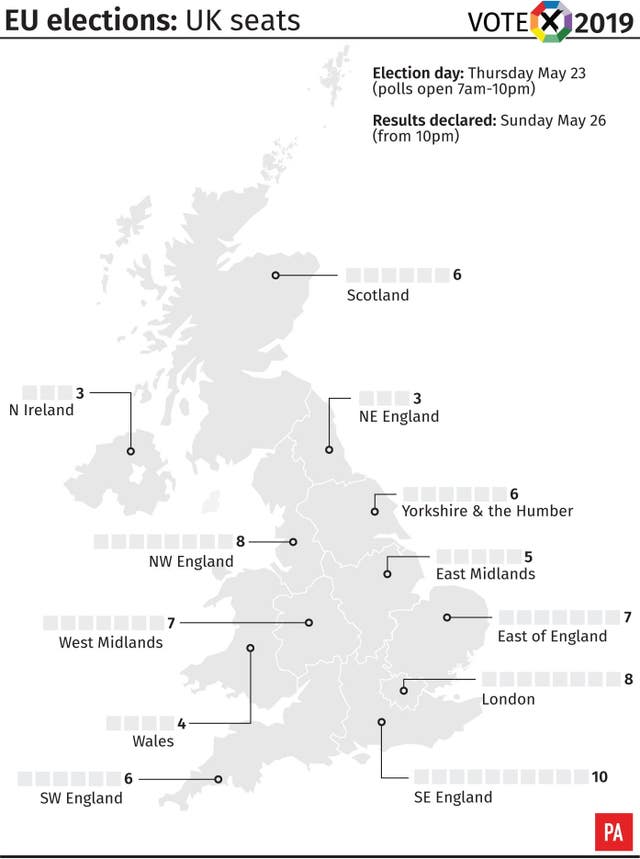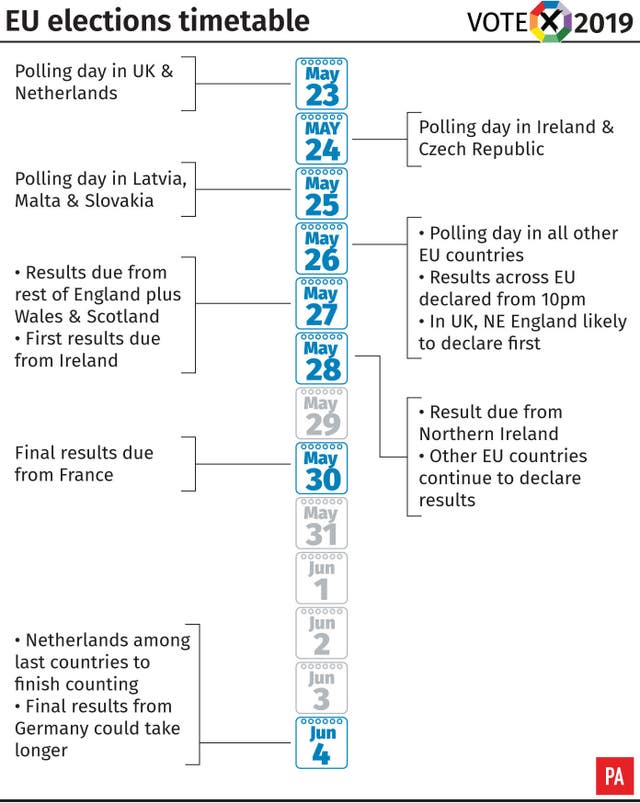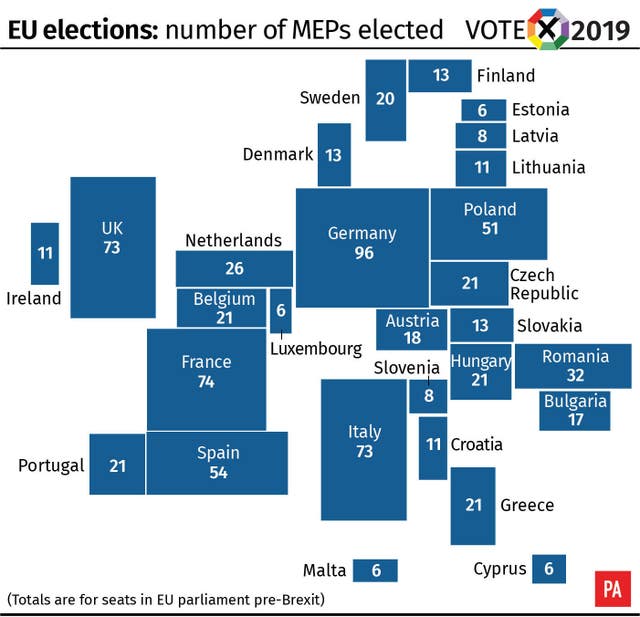
On Thursday, voters across the UK voters will elect 73 Members of European Parliament(MEPs) to represent 12 regional constituencies.
But who is likely to win the EU election in the UK and what time can we expect the results?
Who is likely to secure the most votes in the EU elections?
The amount of MEPs for each constituency is determined by population with six being elected in Scotland.
In Scotland, the pro-Scottish independence parties are expected to win four of the six seats, with the SNP securing three and the Greens, one. The Brexit Party are also expected to take a seat with Labour also projected to take one seat.
READ MORE: Poll puts Brexit Party into second place in Scotland as pro-Scottish independence parties gain
Over one in three votes in Scotland were for pro-Remain parties.
However, the results are markedly different across the UK as a whole, with the Brexit Party expected to secure over 30% of the vote.
European elections: What time are the results?
Here are the key timings for the declaration of the UK’s results in the European parliamentary elections. All times are approximate.
– 10pm, Sunday May 26
Results can be officially declared on Sunday May 26 from 10pm onwards.
In most areas of the UK, votes will have been counted earlier in the day and the results passed to one of the regional declaration centres.
Once final checks and calculations have been completed, the returning officer at the declaration centre will then announce the result for their region.
– 10.30pm
North East England is expected to be the first region to declare. The result in 2014 came at 10.15pm.
Three seats are up for grabs in the North East, two of which are being defended by Labour and one by the Brexit Party.
If Labour loses one or both of its seats, it could signal a collapse of the party’s support in its former northern heartlands.
– 11pm
Yorkshire & the Humber (six seats) is likely to be the second region to declare.
Labour and the Conservatives are each defending two seats here.
South West England (six seats) could also declare around this time, where the Greens will be hoping to hold on to a seat and maybe pick up a second.
The Brexit Party will be looking to increase its current tally of one seat in the region, possibly at the expense of the Conservatives.
 (PA Graphics)
(PA Graphics)
– 11.30pm
East of England (seven seats) and the East Midlands (five seats) are expected to declare around this time.
Both could see the Brexit Party make gains from the Conservatives, particularly in the East of England where the Tories are defending three seats.
– 12am, Monday May 27
Labour, Plaid Cymru, the Tories and the Brexit Party are each defending one seat in Wales. Will any of them manage to pick up a second – or be wiped out entirely?
The West Midlands (seven seats) is also due to declare around midnight.
– 1am
North West England (eight seats) and South East England (10 seats) should have declared by now.
READ MORE: European elections 2019: Why is the UK involved and what does it mean for Brexit?
In both regions Labour and the Tories are likely to be squeezed by the Brexit Party on one side and the Liberal Democrats and Greens on the other.
South East England was the only region of the UK in 2014 to elect a Liberal Democrat and the party will be keen to hang on to its seat, and possibly add another.
 Election">(PA Graphics)
Election">(PA Graphics)
– 2am
London is likely to declare soon after 2am.
There are eight seats up for grabs, four of which are being defended by Labour and two by the Tories.
The Lib Dems, Greens, Change UK and the Brexit Party all fancy their chances here, and, once all the votes are counted, the political make-up of the capital’s MEPs could be radically changed.
– 11am
Scotland (six seats) will take longer to declare than the rest of England and Wales, because the Western Isles will not begin counting results until Monday.
The official result is not due to be announced until late morning, but local results will give a sense of how the parties are performing.
The SNP is defending two seats and are hoping to gain a third, while the Tories could lose their one seat.
Monday morning is also when counting gets underway in Northern Ireland.
– By 6pm, Tuesday May 28
Northern Ireland has three seats, all of which are likely to have been allocated by late Tuesday afternoon.
A different system of proportional representation is used in Northern Ireland, meaning seats are allocated over a sequence of counts rather than all at once.
The first seat is likely to be allocated by Monday evening, with the second and third on Tuesday.
 (PA Graphics)
(PA Graphics)
How do European elections work?
Under a system known as the d’Hondt method, parties put forward a list of candidates who are then elected on a proportional basis, so if a party obtained 25% of the vote, they should, in theory, obtain 25% of the seats for that country.
How did Scotland vote the last time?
The last time EU elections were held in Scotland, in 2014, the SNP and Labour won 2 seats each, with the Conservatives and UKIP also winning one seat.



Why are you making commenting on The Herald only available to subscribers?
It should have been a safe space for informed debate, somewhere for readers to discuss issues around the biggest stories of the day, but all too often the below the line comments on most websites have become bogged down by off-topic discussions and abuse.
heraldscotland.com is tackling this problem by allowing only subscribers to comment.
We are doing this to improve the experience for our loyal readers and we believe it will reduce the ability of trolls and troublemakers, who occasionally find their way onto our site, to abuse our journalists and readers. We also hope it will help the comments section fulfil its promise as a part of Scotland's conversation with itself.
We are lucky at The Herald. We are read by an informed, educated readership who can add their knowledge and insights to our stories.
That is invaluable.
We are making the subscriber-only change to support our valued readers, who tell us they don't want the site cluttered up with irrelevant comments, untruths and abuse.
In the past, the journalist’s job was to collect and distribute information to the audience. Technology means that readers can shape a discussion. We look forward to hearing from you on heraldscotland.com
Comments & Moderation
Readers’ comments: You are personally liable for the content of any comments you upload to this website, so please act responsibly. We do not pre-moderate or monitor readers’ comments appearing on our websites, but we do post-moderate in response to complaints we receive or otherwise when a potential problem comes to our attention. You can make a complaint by using the ‘report this post’ link . We may then apply our discretion under the user terms to amend or delete comments.
Post moderation is undertaken full-time 9am-6pm on weekdays, and on a part-time basis outwith those hours.
Read the rules hereLast Updated:
Report this comment Cancel